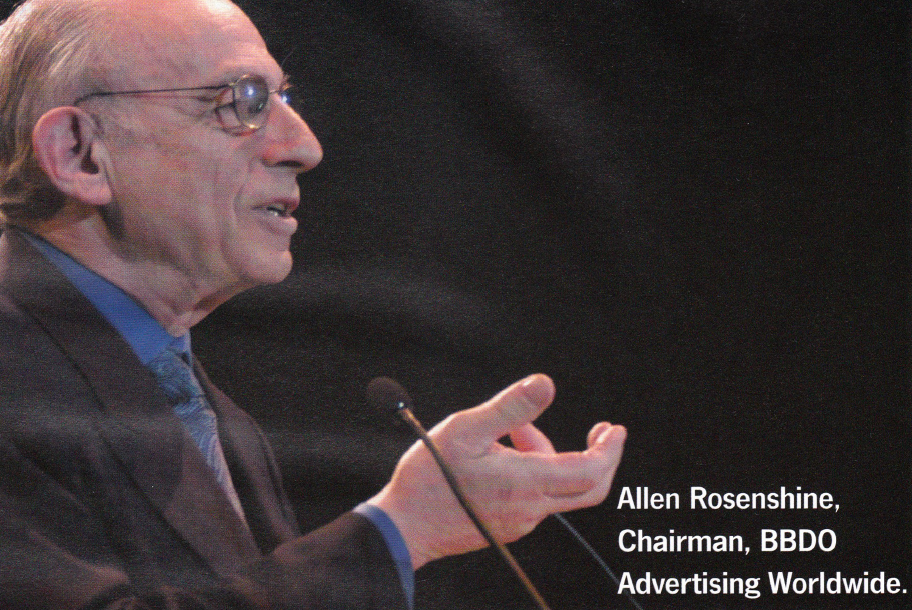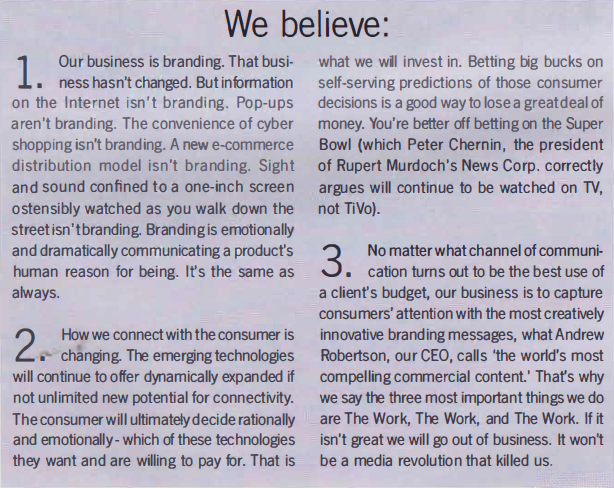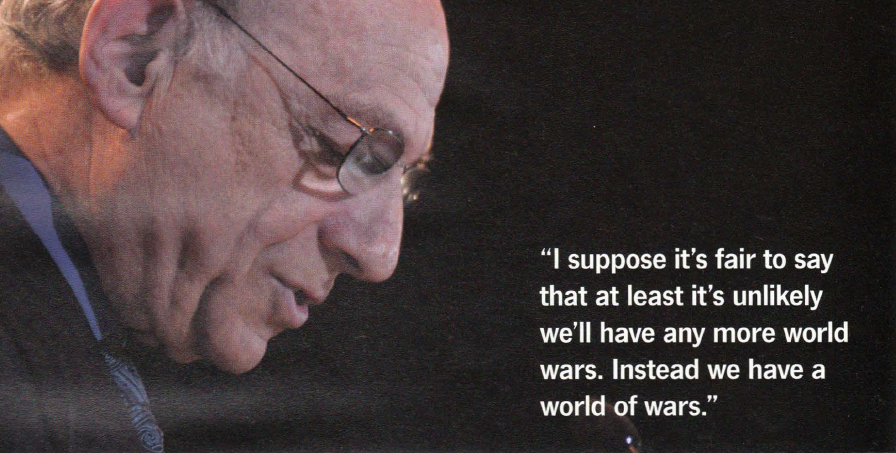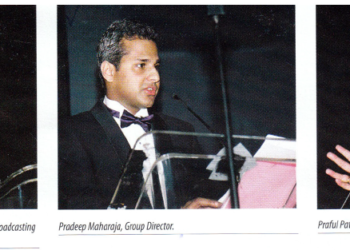
In looking at the subjects being discussed over the three days of this 40th IAA World Congress, and indeed the overall theme the ‘Challenges’ of Change, I found practically every one of them very much in tune with the concerns all of us in marketing and communications should have today.
The presentation by Tateo Mataki (CEO, Dentsu Advertising, Japan) earlier this afternoon ‘Transcending the Traditional Definition of the Ad Agency’ certainly captures the essence of the advertising community’s biggest challenge in all the time I’ve been part of it, which is far longer than I like to talk about.
I am sure that the talk by Bob Greenberg, Chairman/CEO/Chief Creative Officer of R/GA advertising, will deal with the question of the viability of advertising as we know it today in a way that suggests I am a perfect representative of it — old, out of date, and practically extinct.
But I do like the title he has chosen — ‘A New Formula for Customer Engagement’ -because it recognises that ‘engagement’ has been, is, and will continue to be the concern of those of us who believe that advertising, or any form of marketing communications for that matter, should reach out to consumers on both an emotional as well as rational level, to truly ‘engage’ our audiences so as to earn their attention. And I don’t think there should be any argument that these days, we must actively win their eyes and ears for our messages.
Today we call it ‘permission marketing,’ but whatever we call it, we know that consumers’ attention is an ever more precious and hard to achieve goal in a world that seems to make more and more demands on every minute of our day. And when it comes to those demands, the law of supply and demand is way out of kilter, because the demands for attention far outweigh our supply of time. In fact, a recent analysis done by BBDO showed that while the number ofTV channels, radio stations, and magazines mllltiplf;’ while more and more pieces of direct mail stuff our letterboxes; while Internet access fills our computer screens with e-mails every morning; and while the whole slew of new communications opportunities that wireless and broadband technology are creating daily continue to multiply geometrically, the fact is we have no more time to spend on all this new media than we had twenty years ago, when our media choices were a small fraction of what is available, and growing, today. The demands on our time are becoming overwhelmed by an overwhelming supply of media. After all, we still have one or two old-fashioned things to attend to, jobs to do, families to raise, and the need for an occasional hour or two of sleep.
“Content is a big enough problem today, but in the brave new world, if nqt advertisers, who will provide the
So even if the debate in this IAA congress centres on alternatives to traditional media, it’s nice to hear that despite much recent controversy and angst over new versus old media, at least I think we all appreciate the necessity of engaging consumers, regardless of the media channel.
The issue that we all face is that we can no longer assume they are watching what we want them to watch, or listening to what we want them to hear. Today, we’ve got to earn their attention — and once we’ve gotten it, we must actively engage them in a way that can influence attitudes and behaviour for the benefit of our clients.
And speaking of controversy regarding old and new media, I must admit to having stirred up a bit of it myself. I recall some years ago, Advertising Age ran a story with the headline ‘Rosenshine Says New Technology Is Bullshit,Now of course, I didn’t say that. What I actually said at the time is that the way in which many advertising agencies were responding to the new technologies was indeed largely nonsense. I believed that then and I willingly repeat it again today.
I can well understand the proponents of the new media technologies who are trying to build businesses around the often astounding capabilities of the Internet and the multitude of new communications opportunities, whether broadcast or broadband, wired or wireless, cable or satellite, all selling a new world according to their sometimes self-serving visions.
I can also understand clients, particularly those trying to compete globally, wanting to find more effective and efficient uses of their billions of annual communications dollars looking for new alternatives, looking for change, looking for new technologies to provide greater impact for their brands with measurable ROI accountability. And I certainly agree with advertising agencies looking to new and more technology attuned leadership in order to keep pace with where consumers are headed, and the challenges from clients under ever increasing competitive pressures to keep up with their audiences.
What I cannot understand is the marketing and advertising community declaring ourselves to be the dinosaurs of a dying communications world in which our only hope of survival is to stop doing what we have been doing with considerable success, and start doing everything differently. Last Tuesday, just one week ago, Rupert Murdoch, one of the most successful, experienced, and need I say, wealthiest people in the world as a result of his great success in media, put a figurative gun to his own head and did everything but pull the trigger. As reported in the business press, Murdoch ‘sounded the death knell for the era of the media baron .. .’
Now, I recall that ten years ago, we began to hear much the same thing about media — about television, radio, magazines, movies, books, and indeed about advertising, setting off a five-year barrage of babble, which only finally subsided in the bursting of the dotcom bubble. Last week, Murdoch warned that ‘It is difficult, indeed dangerous, to underestimate the huge changes this revolution will bring or the power of developing technologies to build and destroy, not just companies but whole countries.’
I recall that ten years ago, we heard much the same about the power of the Internet to bring totalitarianism to its knees in the awakening of repressed peoples, arising to the opportunities of being newly connected to the knowledge and experience of a world they had never known before. However, I’m sorry to say that somehow I don’t think that is quite what we have been seeing in the turn of the century. Murdoch further declared that ‘Never has the flow of information and ideas … been more important. The force of our democratic beliefs,’ he said, ‘is a key weapon in the war against religious fanaticism and the terrorism it breeds.’
Well, I sure hope he’s right. But I can’t help observing that as the ‘flow of information and ideas’ increases, so does ‘religious fanaticism and the terrorism it breeds.’
Okay, far be it from me to argue with Rupert Murdoch. All I’m saying is that when he, and many others, tell us we must change — and fast — or we will die — and now — I suggest there is as much danger in blindly accepting such hyperbole, as there is in stupidly ignoring it.
But in fact, Murdoch issued a very real and very wise warning when he also said that ‘Societies or companies that expect a glorious past to shield them from the forces of change driven by advancing technology will fail and fall.’
Of course, he’s absolutely right. And we are changing, a lot faster than maybe some of us older timers can cope with. But the real world out there is also changing a lot more slowly than the hypesters would have us believe. I admit it’s not a very sexy position for me to be taking. But then again, at my age sexy positions are fewer and farther between.
Anyway, at this point, we finally seem to have come out of the marketing and advertising doldrums set off by the dotcom bubble. I can tell you that 2001, 2002, and 2003 were the worst years I can recall since joining BBDO. And that, I hate to admit, was more than 40 years ago. But now that things are looking up a bit, I am beginning to hear rumblings very much like the stuff that led to my intemperate headline in Ad Age. Could it be, as the great philosopher, Yogi Berra, put it, ‘It’s deja vu all over again?’
About a year ago, we heard predictions that just one company’s satellite radio advertising revenue in the USA will grow from $1 million to $100 million in just three years. The CEO further predicted that satellite radio will be bigger than cable and satellite TV combined, and oh yes, in a few years, they will turn an operating profit. Does that sound familiar? Well unlike the heyday of the dotcom, there is at least the recognition that somewhere along the line, revenue needs to exceed cost. What very few, if any, of the new media gurus ever discuss is what fact-based research they have to convince them that people will want what they are boldly predicting they will buy, nor is there much analysis of how much they will be willing to pay for it.
Nor are we dealing with the problem of content. How will we finance the tremendous need for content that can capture audiences who can come and go with the flick of a flying thumb? Where is the money coming from, if the currently popular prediction of DVRs eliminating the paid commercial proves true? Years ago, we were correctly told that 500 TV channels would be available to US viewers. But what nobody mentioned is that 495 of them would not be worth watching.
Content is a big enough problem today, but in the brave new world, if not advertisers, who will provide the revenue from which media content will be developed? Many blithely suggest that the resources will be generated by a new model based on pay-per-view or video on-demand. I suggest they stop thinking of the consumer as willing to pay for everything and anything technology can create. When the dotcoms did it, he resul was what Alan Greenspan called ‘irrational exuberance.’ I call a pretty good definition of corporate insanity.
“The opportunities of the new media will succeed or fail depending on how well or badly they evolve in conformity with the apparently unchanging aspects of the human condition.”
Look, I don’t doubt for one instant that the technology exists for us to have everything we get from TV, from the Internet, from telecommunications all on a device as portable and cool as my Motorola Razr.
But I do doubt for at least a few moments that very many people will want to watch sports, movies, or most entertainment events on a oneinch screen. Yes, there will be many types of information and other content for which wireless hand-held devices will be the primary medium. But they will not put an end to TV, movies, magazines, newspapers, billboards, or radio {satellite or otherwise) any more than TV ended movies, or VCRs ended video rentals, or any new communications technology ended any other. Books are also still doing pretty well, thank you, for which I am grateful since mine will be published in about two months. {You know, word of mouth will always be an advertising medium.)
Look, all of us have heard in one form or another that the Internet is a communications capability that will change the course of human history. But indulge me for a few moments.
Because I cannot think of one advance in communications technology, one innovation in the history of media, that has materially changed human nature — the basic way people and their institutions behave.
Every major invention, every new discovery, every historical revolution in communications carried with it the litany that the world was about to change — and of course for the bette?. Guttenberg, Morse, Bell, Edison, Marconi all came and went. And Adolph Hitler, Joseph Stalin and Mao Zedong came after them. Are we today any smarter, or more democratic, or in any human way better than the ancient Greeks7 They had their wars, we have ours. Their societies enslaved people in many ways -physically, economically, socially, and militarily. So do ours.
Where the communications revolutions of the past may not have changed the state of humanity very much, the new media revolution of today, we are told, is different. The Internet will be the ultimate democratising influence, as governments and institutions of all kinds will find their power usurped by the people, who will have virtually unlimited access to information and to each other. Well, all this has been great news for pornographers and terrorists, but not of much help to the poverty-stricken populations of this brave new world.
I suppose it’s fair to say that at least it’s unlikely we’ll have any more world wars. Instead we have a world of wars. There are more people dying at this very moment as a result of human malice than at any time in history. But I don’t think we’re any better or worse than we used to be. Athens and Sparta didn’t exactly get along. Human nature, for better or worse, is what it’s always been, only now it’s on a bigger scale.
We are told, at least when it comes to the marketplace, changes must certainly be in store. The people may not control the means of production in the Marxist sense, but comes he communications revolution, the people will certainly determine what gets produced. The consumers, we hear, are taking control away from manufacturers and marketers and advertisers. With greater access to information, the consumers will decide what they need, what they want and what they will buy. Beyond that, with the new technologies at their fingertips, the consumers will decide what, when and how we will communicate with them. Through the miracle of interactivity, the consumers will become our boards of directors.
Well guess what. That isn’t new. The supposedly revolutionary idea that the consumer is now in control assumes that they have until now been a passive and somewhat stupid tool in the hands of the producers. Well, why is it then, that in the US, in fast moving consumer goods, three out of every four new products have failed? Why is it that the American consumer continues to nearly drive the American car manufacturers out of business, as the Japanese bring to market more of what they actually want? Why is it that we spend so many research dollars to find out what consumers think about what we are offering them? If the consumer hasn’t been in control, why haven’t they just done what they were told7 That would certainly be a revolution!
So, are we really in the throes of a media revolution that demands marketing and advertising must change radically and rapidly, as we have been told for the past ten years7 Or are we in yet another technologically driven communications opportunity that allows us to enhance and evolve what we have been doing, making us more efficient, more effective and more productive than before? With apologies to George W. Bush, and the other religious leaders of the world, I believe in evolution. The new media is not a revolution in the basic dynamics between seller and buyer. To believe otherwise, you have to believe that somehow the Internet combined with the new hand-held technologies will fundamentally change human nature from the complex, emo tionally driven organisms we are to the more rational, logical, reasonable species we have never been. You have to believe that people will grow their left brains and shrink their right. You have to believe that the other little revolution in the last hundred years — you know, the communism thing? – would have succeeded because it was logical, if only the Russians hadn’t spent so much time on their Stolichnaya. Communism failed because its logic was contrary to human nature. The opportunities of the new media will succeed or fail depending on how well or badly they evolve in conformity with the apparently unchanging aspects of the human condition.
That is why advertising agencies must continue to do what they have been doing, only maybe even better. We are the experts at understanding the consumer. We are the experts at linking their emotions, their feelings, and their life-styles to the functionality of the products and services our clients produce. We are the experts at identifying and focusing attention on the relevance of our clients’ goods and services.
That’s what a brand is. And we are the experts at branding. Even the most committed proponents of the new media technologies agree on the benefits of branding. How, after all, can you ignore the triple-digit growth in market capitalisation over the past ten years of Nike, IBM, PepsiCo P&G, just to name a few American multinationals7 This growth was built on the asset value of their brands, not their bricks and mortar. And those asset values were in turn built on brand advertising.
One thing that will not change, even in the midst of the ongoing explosion of technological growth, is the continuing importance of branding — what constitutes a brand, how a brand is developed and nurtured, and most important, how a brand is communicated to consumers. What we ancients know about brands will remain relevant in the face of any new technological development.
We are the experts at creating them, communicating them, and keeping them competitive. And unless you are foolish enough to forget the debacle of the dotcoms’ total lack of understanding this fundamental tenet of marketing, unless you really believe that the new media will make branding inconsequential, we are going to be around for a long time. Because there’s nobody else out there to do it.
brand-building advertising. It needs agencies that adapt their creativity to the new media opportunities to bring a consistent and total brand experience in all media attuned to the consumers’ mindset. What we need is what, in fact, none other than Rupert Murdoch enthusiastically promoted in his speech last week, when he said that it is ‘the words, pictures and graphics … (that} must feed the mind and move the heart.’ I couldn’t agree more completely.
With that in mind, I would now beg your indulgence to a look at just five minutes of recent BBDO advertising and as you do, ask yourself two questions. First, wouldn’t these commercials in fact better dispose the viewer toward the brand? And second, would this positive effect be possible to achieve as dramatically in any other medium?
All that having been said, I know we have to change. The operative word is ‘evolve.’ I really do recognise that any agency that expects to live solely on traditional broadcast and print advertising won’t be living very well, if at all. I think we realise that if we are to continue to be the source of our clients’ brand strategies and messages, we will have to be media neutral in our planning and capable of coordinating and executing creatively in an expanding menu of channels of communication. We will have to do more than just communicate brands. We will have to help manage them as technology offers more and more sophisticated consumer contact opportunities.
We all say this, but it is far easier said than done. Making acquisitions in the new communications disciplines doesn’t do it. There must be true convergence at the strategic planning level of product design, mass and interactive advertising, direct marketing, sales promotion, packaging, point-of-purchase display, public relations, and all forms of brand messages. Just owning these resources is not enough. We must consider these capabilities as a strategic tabula rasa with the only imperative being to maximise the effectiveness of a given marketing budget.
Let me close by outlining what BBDO believes as we adapt and evolve in response to the opportunities of the new media. (You didn’t expect to get away without at least one self-serving promotion on behalf of my agency, did you? In the tradition of good advertising, I’ll try to keep it short and simple.







